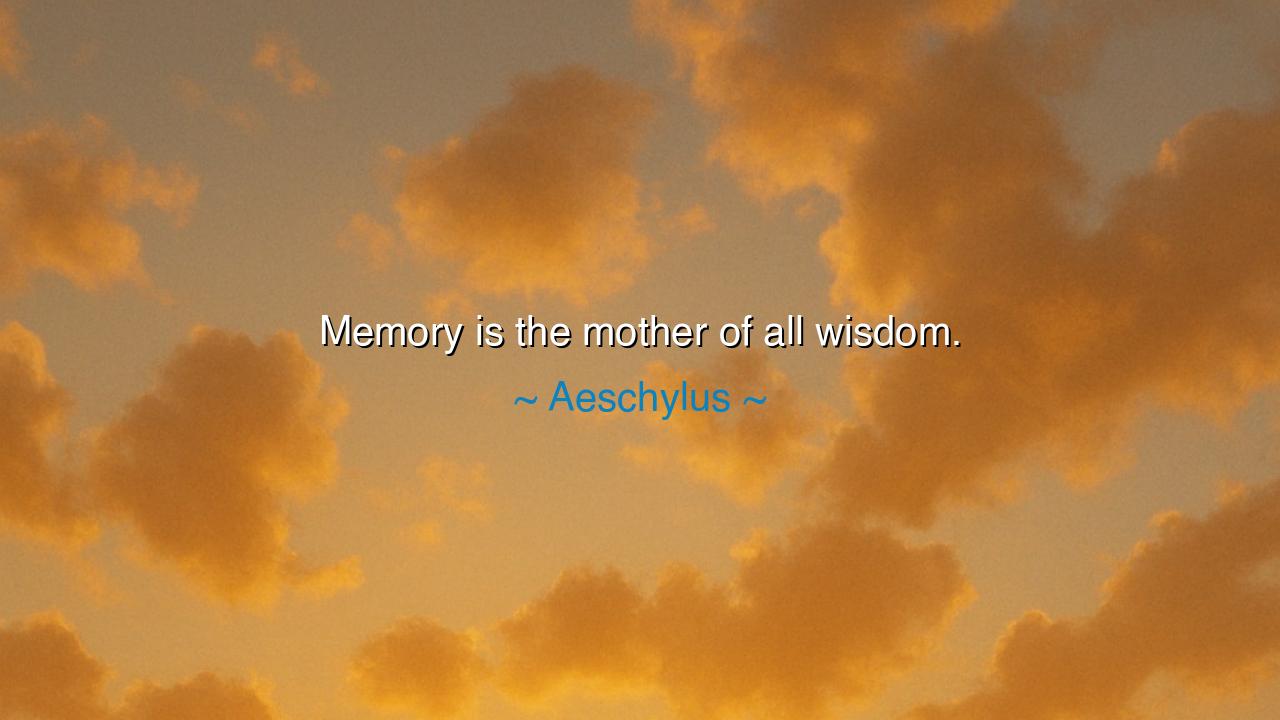
Memory is the mother of all wisdom.






"Memory is the mother of all wisdom." Thus proclaimed Aeschylus, father of tragedy, whose words echo across the ages like thunder rolling through the mountains of Greece. His teaching is this: that without memory, man cannot learn, cannot grow, cannot carry the fruit of experience into the dawn of tomorrow. It is through memory that pain becomes teacher, that joy becomes guide, that error becomes counsel, and thus from the ashes of the past, wisdom is born.
The ancients revered memory as divine. In their myths, Mnemosyne, goddess of remembrance, was said to be the mother of the Muses, those daughters who gave birth to song, history, and knowledge. Even in legend, they understood that all arts, all sciences, all truth spring from memory. For how can man compose poetry, govern a state, or wage just war without recalling the deeds of those who walked before? To forget is to stumble blindly; to remember is to walk with the lamp of wisdom.
Consider the story of the fall of Athens after the Peloponnesian War. A city that once shone as the jewel of democracy forgot the humility that had made it great. Forgetting the lessons of moderation, it pursued arrogance and greed. That failure of memory destroyed it. By contrast, Rome in its early days remembered the errors of kingship and forged a republic in answer. Their memory preserved them, until later generations forgot again, and empire replaced liberty.
So too in the life of individuals. Abraham Lincoln carried within him the memory of hardship—his childhood poverty, the sting of failure, the grief of loss. From these memories he drew patience, compassion, and the strength to endure the trial of civil war. His greatness was not born of ease but of remembrance, and through it, his leadership became a wellspring of wisdom for a fractured nation.
Therefore, let this be taught to all who come after: guard your memory well, for it is the seedbed of wisdom. Do not despise your past, whether of triumph or of sorrow, for each holds lessons that the future demands. He who forgets is condemned to repeat folly, but he who remembers walks with armor against error. Aeschylus spoke truly: memory is not only the keeper of the past, but the mother of all wisdom, birthing light for generations yet to come.






TVTrang Vo
Aeschylus’ perspective that memory is the source of wisdom is powerful, but it also makes me think about how trauma or negative experiences might affect our memory. Can painful memories truly lead to wisdom, or do they sometimes hinder growth? How do we balance the lessons we learn from memory with the need to let go of past pain in order to move forward?
NVNamm Van
Memory really does play a pivotal role in shaping our wisdom, but is it possible to be wise without a clear recollection of the past? In the age of technology, where so much is recorded, are we losing the essence of memory by relying too heavily on digital reminders? How do we reconcile the value of lived experiences with the constant flood of information we receive today?
HHnguyen huy hoang
This quote makes me reflect on how much we rely on our memories to make sense of the world. I wonder, though, how does memory work when it’s selective? Can we truly rely on our recollections to lead us to wisdom, or do we sometimes forget the lessons we need the most? Could it be that wisdom comes from reflecting on memories with a certain kind of awareness?
QCNguyen Quynh Chi
I really resonate with Aeschylus' idea that memory is the mother of wisdom. It’s true that our experiences, both good and bad, shape our understanding and knowledge. But do you think that sometimes our memories can distort the truth or create biases? How do we ensure that our memories truly contribute to our wisdom, rather than leading us to repeat past mistakes?